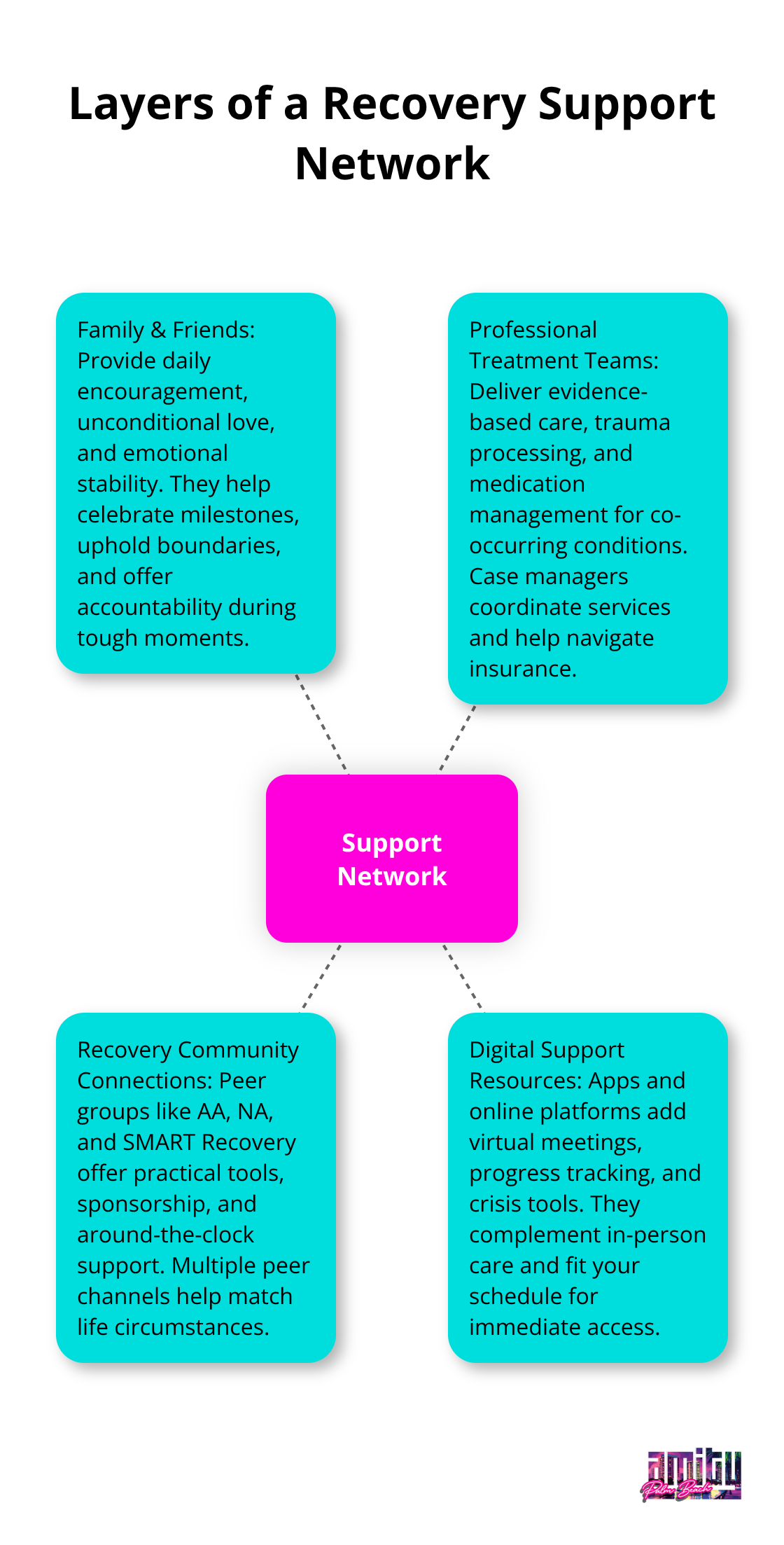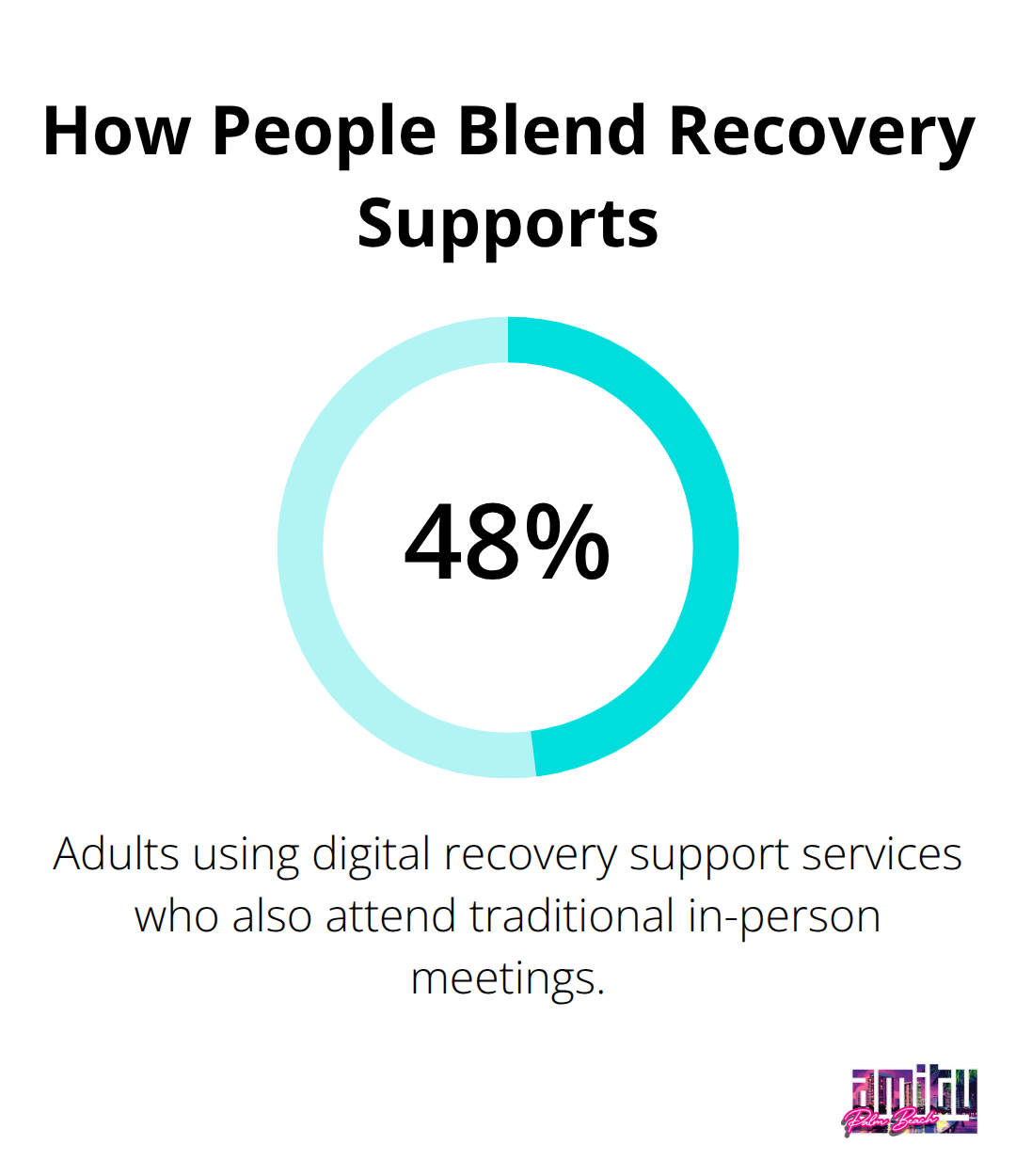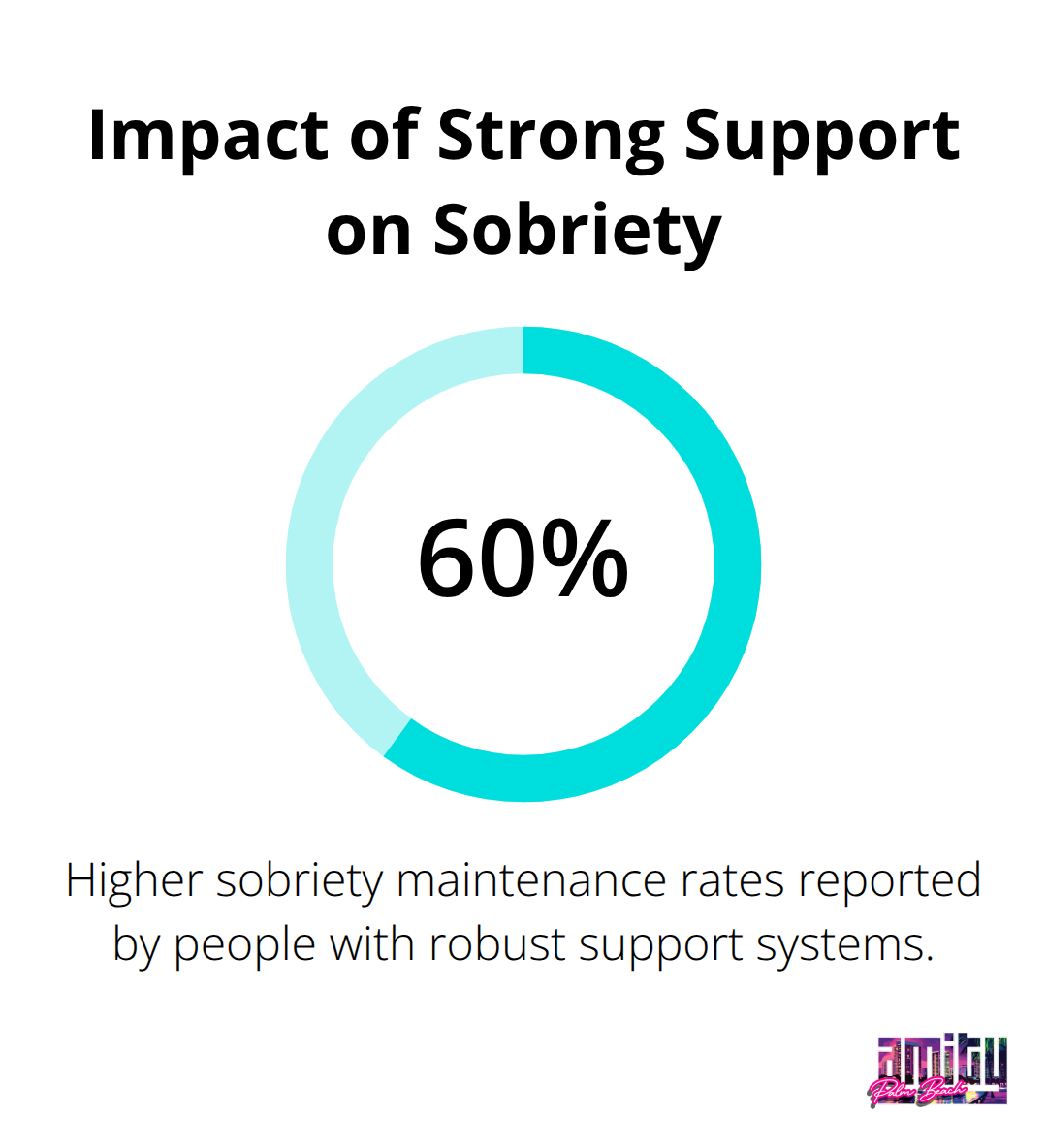Recovery from addiction requires more than individual willpower. The importance of support in addiction recovery cannot be overstated, as studies show people with strong networks are 60% more likely to maintain long-term sobriety.
We at Amity Palm Beach understand that building these connections takes intentional effort and strategy. The right support system becomes your foundation for lasting recovery success.
What Types of Support Can Help Your Recovery
Your recovery support network consists of three distinct layers, each serving specific functions in your healing journey. Family and close friends form your emotional foundation and provide unconditional love and daily encouragement.

However, not all family members can handle this responsibility effectively. Research shows that families affected by addiction go through various and complex issues during the recovery process. The key is to identify which relatives and friends genuinely support your sobriety versus those who enable destructive patterns. You need people who will celebrate your milestones, hold you accountable during difficult moments, and respect the boundaries you set around substances and toxic behaviors.
Professional Treatment Teams
Your clinical support team includes addiction counselors, therapists, psychiatrists, and medical professionals who provide evidence-based treatment interventions. These professionals offer specialized knowledge that family members simply cannot provide. Licensed therapists help you process underlying trauma that fueled your addiction, while psychiatrists can prescribe medications for co-occurring mental health conditions. Research indicates that integrated professional treatment addresses the serious and costly public health problems associated with excessive substance use, including injuries, homicides, and suicide. Your treatment team also includes case managers who coordinate care between different providers and help navigate insurance coverage for ongoing services.
Recovery Community Connections
Peer support groups like Alcoholics Anonymous, Narcotics Anonymous, and SMART Recovery connect you with others who understand addiction firsthand. These communities provide practical coping strategies, sponsorship relationships, and 24/7 availability when cravings strike.

Research shows that 48% of adults who use digital recovery support services also participate in traditional in-person meetings (this indicates that multiple peer support channels work best). Recovery communities offer demographic-specific groups for professionals, LGBTQ+ individuals, and young adults, which allows you to connect with people who face similar life circumstances and recovery challenges.
Digital Support Resources
Online recovery platforms and mobile apps extend your support network beyond physical meetings and appointments. Digital recovery support services complement traditional treatment methods and provide immediate access to resources when you need them most. These platforms offer virtual meetings, recovery tracking tools, and crisis intervention features that work around your schedule. Studies indicate that people who combine digital resources with in-person support achieve better long-term outcomes than those who use only one approach.
Now that you understand the different types of support available, the next step involves strategically selecting and assembling the right combination of people and resources for your unique recovery needs.
How Do You Choose the Right People for Recovery
Effective support network construction starts with honest evaluation of your current relationships and strategic selection of new connections. Start by listing every person in your life and categorize them into three groups: supporters who encourage sobriety, neutrals who neither help nor harm your recovery, and detractors who enable addiction or create stress that triggers relapse. Research from the Substance Abuse and Mental Health Services Administration shows that individuals with peer-based support resources are significantly less likely to relapse and maintain stronger community connections. Focus your energy on the supporters while you gradually distance yourself from detractors.
How to Spot Genuine Support Versus Empty Promises
Trustworthy supporters demonstrate consistent actions rather than make grand gestures or promises they cannot keep. Look for people who check in regularly without prompts, respect your recovery boundaries without arguments, and celebrate your progress without minimization of your struggles. These individuals show up during difficult moments instead of disappear when you need them most. Avoid people who claim they support your sobriety but continue to invite you to events with substances, minimize your addiction as a phase, or become defensive when you set boundaries around substance use.
How to Create Distance from Harmful Relationships
Boundary establishment with toxic relationships requires direct communication and consistent enforcement. Tell family members and friends explicitly what behaviors you will not tolerate, such as substance presence around you, criticism of your treatment choices, or guilt trips about past mistakes. When someone violates these boundaries, implement immediate consequences like situation departure, phone call termination, or contact frequency reduction. Studies indicate that adults with strong social connections show lower inflammation levels and higher illness resistance (which means protection from toxic stress directly improves your physical recovery outcomes).
How to Communicate Your Recovery Needs Effectively
Effective communication about your recovery needs requires specific requests rather than general statements about support desires. Instead of saying you need help, ask for concrete actions like daily check-in texts, rides to meetings, or accountability for therapy appointment attendance. Tell your supporters exactly how they can help during cravings, what warning signs to watch for, and which responses work best when you feel overwhelmed. Most people want to help but lack addiction recovery knowledge, so clear guidance transforms well-meaning friends into effective support team members. Professional treatment programs can also provide guidance on building these communication skills.
Once you identify and recruit the right people for your recovery network, the next challenge involves maintenance and strengthening of these relationships over time.
How Do You Keep Your Support Network Strong
Support relationship maintenance requires consistent effort and strategic communication patterns that evolve with your recovery progress. Schedule weekly check-ins with your core support team members through phone calls, text messages, or in-person meetings to maintain connection momentum. Research from the National Institute on Alcohol Abuse and Alcoholism provides up-to-date statistics on drinking patterns and treatment outcomes. Set specific days and times for these interactions rather than wait for crisis moments to reach out. Share both struggles and victories during these conversations to build authentic relationships based on honest communication rather than surface-level pleasantries.
Transform One-Way Support Into Mutual Relationships
Recovery support works best when you give back to the people who help you rather than maintain purely one-directional relationships. Offer practical assistance to your supporters when they need help with errands, emotional support during their difficult times, or share your recovery skills with newcomers in treatment programs. Studies indicate that people who help others in recovery experience stronger motivation to maintain their own sobriety and report higher life satisfaction scores. Ask your supporters what challenges they face and actively listen to their responses without immediately redirecting conversations back to your recovery needs. This reciprocal approach prevents supporter burnout and creates deeper bonds that sustain long-term recovery success.
Adapt Your Network as Recovery Stages Change
Your support system requirements shift dramatically as you progress from early recovery through long-term maintenance phases. During the first 30 days, you need intensive daily contact and crisis intervention capabilities from your network members (this period requires maximum support intensity). After six months of sobriety, reduce daily check-ins to weekly conversations while you add accountability partners for specific goals like career advancement or relationship rebuilding. Research shows that people who adapt their support networks to match recovery stages experience better outcomes than those who keep static support structures. Replace some intensive clinical support with peer mentorship opportunities and community service activities that provide purpose beyond addiction recovery.
Handle Supporter Fatigue and Relationship Changes
Support network members may experience fatigue or life changes that affect their availability over time. Address these situations directly through honest conversations about capacity and expectations rather than assume people will maintain the same level of involvement indefinitely. Some supporters may step back naturally as your recovery stabilizes, while others may increase their involvement as they see your progress (this natural ebb and flow is normal and healthy). Develop backup support options for each primary supporter so you maintain consistent coverage when people need breaks or face their own challenges. Thank supporters regularly for their contributions and acknowledge that their needs matter too in these relationships.
Final Thoughts
The importance of support in addiction recovery extends far beyond temporary encouragement during treatment. Effective support systems combine three essential elements: diverse relationship types that address different recovery needs, consistent communication patterns that maintain connection strength, and adaptive flexibility that evolves with your progress stages. Strong recovery networks deliver measurable long-term benefits that compound over time.

People with robust support systems report 60% higher sobriety maintenance rates, improved physical health outcomes, and greater life satisfaction scores compared to those who attempt recovery alone. These relationships provide accountability during vulnerable moments, practical assistance with daily challenges, and emotional validation that reduces isolation and depression risks. Your support team becomes the foundation that sustains recovery success through both challenging and celebratory moments.
You can start this process today with one honest conversation about your recovery needs (identify three people who genuinely want to help your sobriety success and ask them for specific assistance like weekly check-ins or meeting transportation). We at Amity Palm Beach understand that professional treatment programs provide the clinical foundation and guidance needed to develop these essential relationship skills. Your recovery deserves the strongest possible foundation through intentional support network construction and maintenance.




